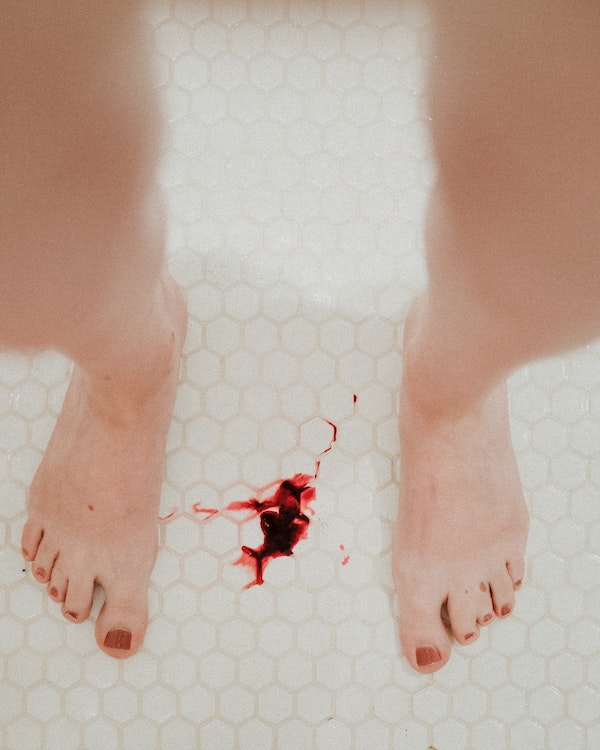I started my monthly cycle around the age of 12, and I am currently 44 years old.
So for 32 years of my life, monthly, I have had “Aunt Flo” come to visit (minus my two pregnancies) so I am by no means an expert, but for the sake of this article, I will share with you what I have learned and try to pass on some good period juju from one lady friend to another.
At first, getting my period seemed like a gift from heaven above. I felt cool sitting in a room with my friends being the first one. I felt womanly and ready for anything.
In seventh grade, I had gone shopping with my mom with some of my babysitting money. I picked out some fluorescent pink Quiksilver board shorts and a black tee. I was so excited to wear these shorts, but halfway through art class, I felt something wet “down there.” I quickly excused myself to the bathroom and found that I had “bled through,” and I had a huge red splotch on the backside middle of my pink shorts. I had nothing to cover up my backside and had to do the walk of shame to the nurse’s office where they called my mother.
The leaky period stories don’t stop there and continue to be a menace for as long as I can remember. I was always staining one thing or another.
When I was 15, I started having really bad symptoms of PMS and hormonal acne. I would have a flare-up of rage, irrational thoughts, impulsivity, and zits every month. When I went to the doctor to talk about it, she recommended birth control pills. So I was on those for many years as a teen.
I wanted a more natural cure to my PMS woes, and I was always searching for vitamins that claimed to calm and help out the mental and physical fatigue and weariness that presented itself monthly.
I was diagnosed with PMDD (Premenstrual Dysphoric Disorder) and given antidepressants and antianxiety meds to help with that time of the month, and I took those for many years. I also supplemented and took extra care to limit caffeine and sugar during my PMS times.
What Are the Symptoms of PMDD?
According to Harvard Medical School, a diagnosis of PMDD should include five or more of the following symptoms (at least one related to mood) for most menstrual cycles in the past year:
- Depression
- Anxiety or tension
- Sudden mood changes
- Irritability
- Loss of interest in daily activities
- Difficulty concentrating
- Decreased energy
- Food cravings and appetite changes
- Insomnia or sleepiness
- Physical symptoms, such as breast tenderness or bloating
Every month, I would want to leave my husband, and I would get so ornery and hard to live with. I would obsess about housework and my children’s screen time and could not get comfortable in my skin, so to speak.
In the last few years, I have started tracking my cycles through a flo tracking app. The one I use is called “my flo” by Flo Living, but there are many more out there. The most shocking information I learned from tracking my menstrual cycle was that my PMS (luteal phase) started about 11 days before my menstrual flow. So when I feel like I always have PMS, it’s true!
Something about having a tracker has helped me immensely—mentally, physically, and emotionally. I start feeling like the PMS monster is present, and then I check and I am usually correct, and then I can breathe and remember.
It is just my hormones—my husband and children are fine.
What can I do to take care of me? Am I eating what’s best for my hormone health? Have I been taking my supplements—magnesium, vitex, and chaste tree berry have proven helpful. I also have a powder called “moon balance” by Your Super that tastes great and has Maca and other beneficial herbs for hormones. I see a functional medicine physician who has prescribed other vitamins and supplements that I take as well. I literally have been so desperate that I have tried it all.
I also take a thyroid supplement as recommended by my doctor, because if your thyroid is sluggish, it can hold on to estrogen and your body needs progesterone to balance it out and to push the estrogen through the body. High levels of stuck estrogen can be a huge aggravator of PMS symptoms.
I eat a fully plant-based diet and stay away from caffeine and cane sugar. I exercise regularly and when I don’t, I feel it, and my PMS symptoms are worse.
Tingly, heavy boobs? Try magnesium. There are even special teas for that time of the month like Women’s Moon Cycle by Yogi, Healthy Cycle by Traditional Medicinals, and Pukka has one called Woman kind—the majority of these are made from Raspberry leaf, which can help with mood changes and irritability.
The thing I most like about the flo tracking app is it tells you what cycle you are in for the monthly moon cycle. Did you know that there are four phases, and our body is always preparing for its monthly bleed?
Here they are:
1. Follicular: This is where hormones are at low levels right after your period. They slowly begin to increase in concentration.
2. Ovulation: The egg is released. Your estrogen increases to thicken the uterine lining.
3. Luteal: Estrogen, progesterone, and testosterone are at their highest concentration here. PMS is a typical-common part of this phase
4. Menstrual: Hormone levels decline quickly to their lowest concentrations here. You may feel a tinge of low energy or depression at the end of this phase as the levels start to rise again.
This information is not exhaustive, and there are many symptoms women go through that are far worse than what I’ve mentioned here.
I tend to get a headache a couple of days before my cycle drops, and I’ve read this is very common because of the drop in hormones that comes so quickly. I typically have a couple of days right before when I sleep less and have a hard time staying asleep. I also tend to make impulsive decisions during my PMS phase, and I have to check in with myself when wanting to make a big purchase or decision.
Hormonal health is so important and affects us all. I know we all go through this a little bit differently, but would love to open the dialogue as it seems this is something we all have in common, but rarely talk about.
Please feel free to comment on symptoms, tips, and tools you have used that have been beneficial.
My follow-up article will be on Menstrual Cups. Let’s keep the dialogue open.









Read 14 comments and reply